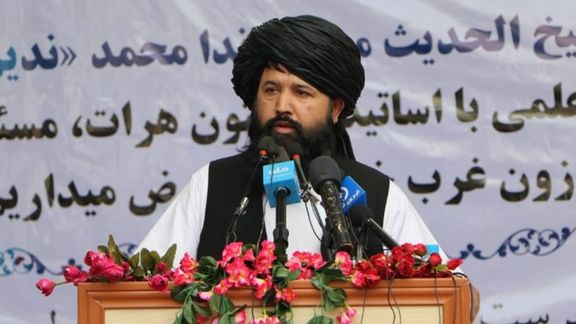Pakistan, Taliban Blame Each Other For Failed Istanbul Talks

Pakistan and the Taliban have blamed each other for the failure of three days of talks in Istanbul aimed at securing a long-term ceasefire and easing cross-border tensions.

Pakistan and the Taliban have blamed each other for the failure of three days of talks in Istanbul aimed at securing a long-term ceasefire and easing cross-border tensions.
Taliban-run national television reported on Tuesday that “certain circles within the Pakistani army” were obstructing the negotiations. The broadcaster, quoting Taliban officials, said the administration “cannot prevent attacks inside Pakistan.”
The Taliban-controlled outlet also accused the Pakistani delegation of “incompetence,” alleging that its representatives “retreat from the negotiating table instead of presenting arguments.”
Media outlets close to the Taliban earlier reported that the Istanbul talks ended “without result.” A Pakistani security source confirmed to Reuters that the discussions had concluded without an agreement.
Neither Islamabad nor the Taliban administration has issued an official statement on the outcome.
Since the start of the Istanbul talks, both sides have repeatedly traded blame for the breakdown of the process. The Pakistani delegation reiterated its demand that the Afghan Taliban act against Tehreek-e-Taliban Pakistan (TTP) militants, whom Islamabad accuses of launching attacks from Afghan territory.
Taliban-run national television, in its latest report, restated the group’s position that Afghanistan “cannot prevent attacks in Pakistan or represent the TTP.”
The broadcaster echoed the Taliban administration’s long-held stance that the Pakistani Taliban issue is Pakistan’s internal matter and that Kabul “will not allow Afghan soil to be used against any other country.”


Peace talks between the Taliban and Pakistan in Istanbul have ended without reaching a long-term ceasefire agreement, according to media outlets close to the Taliban and Pakistani security sources cited by Reuters.
The three-day negotiations, mediated by Qatar and Türkiye, concluded on Monday after hours of intensive discussions, but both sides reportedly failed to resolve key disputes.
A Pakistani security official told Reuters that the Taliban refused to commit to restraining the activities of Tehreek-e-Taliban Pakistan (TTP). An Afghan source familiar with the talks confirmed the breakdown, saying the discussions stopped after “heated exchanges” over the issue. The Taliban delegation, the source added, insisted it had no control over the Pakistani Taliban.
Neither Islamabad nor the Taliban has issued an official statement on the outcome.
According to Afghanistan International’s Istanbul correspondent, Nargis Horakhsh, the Taliban delegation denied the presence of TTP and other militant groups in Afghanistan. In response, the Pakistani side reportedly presented photographs of slain militants carrying Afghan identity cards, along with documents showing that some bodies were repatriated to Afghanistan.
Horakhsh reported that the Taliban delegation “had no response” to the evidence presented. Mediators and host nations are also said to have urged the Taliban to address the presence of armed groups on Afghan soil to promote regional stability and good neighbourly relations.
Pakistan has long accused the Taliban of sheltering TTP militants and allowing them to operate from Afghanistan, claims supported by UN Security Council reports, which confirm the presence of TTP commanders inside the country. The Taliban have repeatedly denied these allegations.
The Taliban’s six-member delegation in Istanbul included Rahmatullah Najib, Deputy Interior Minister; Suhail Shaheen, the group’s representative in Qatar; Anas Haqqani, a senior Taliban figure; Noor Ahmad Noor, First Political Director at the Foreign Ministry; Noor Rahman Nusrat, Director of Operations at the Defence Ministry; and Abdul Qahar Balkhi, the Foreign Ministry spokesperson.
The Pakistani delegation comprised seven members, including diplomats and senior intelligence officials.
The first round of talks, held earlier in Doha, was attended by the defence ministers and intelligence chiefs of both sides and resulted in a temporary ceasefire. However, Pakistan has kept the details of that accord classified, while the Taliban said it would release them once the Istanbul round concluded.
The Istanbul negotiations followed deadly border clashes and Pakistani airstrikes targeting what Islamabad claimed were TTP strongholds in Kabul, Kandahar, and Paktika.
A Taliban Foreign Ministry source told Afghanistan International that Pakistan had demanded the Taliban launch operations against the TTP and officially designate it a terrorist organisation.
The source said Pakistan threatened further airstrikes inside Afghanistan if the Taliban failed to act, warning it would target any “suspicious activity” linked to the TTP.
The Taliban, however, maintained that it does not recognise the Pakistani Taliban as an organised group and considers the issue an internal matter for Pakistan. The group reiterated its pledge not to allow Afghan territory to be used against any neighbouring country.
The source added that the Taliban leadership had instructed its negotiators not to compromise on their stance, accusing Pakistan of attempting to undermine the talks.

Local sources say Taliban forces clashed on Monday in the Payan-Mor area of Shahr-e-Buzurg district in Badakhshan province over control of a gold mine, leaving several casualties.
According to the sources, the fighting erupted between Abdul Rahman Ammar, the former head of Badakhshan’s mining department, and Shafiqullah Hafizi, the current head of mines. Both men are influential Taliban figures in the province.
Reports indicate that Taliban border battalion forces sided with Hafizi and engaged in fighting against Ammar’s men. At least one member of the border battalion was reportedly killed during the clashes.
Sources said Abdul Rahman Ammar, though no longer holding an official position, remains a powerful local commander with his own loyal fighters and stockpile of weapons.
The Taliban’s internal fighting in Shahr-e-Buzurg district comes just three days after another armed confrontation between Taliban factions in the same area.
Local officials said the Taliban deployed reinforcements from the provincial capital to Shahr-e-Buzurg on Monday to prevent the conflict from escalating further.
The Taliban has not yet commented on the incident.
Over the past four years, the Taliban have placed increased emphasis on mining operations across Afghanistan, seeking to boost revenue from natural resources. However, critics and local residents have repeatedly questioned the group’s lack of transparency regarding mineral extraction and how the resulting income is used.

The Taliban’s governor of Balkh province, Yusuf Wafa, has travelled to Termez, Uzbekistan, along with a delegation, days after visiting Tajikistan.
Haji Zaid, spokesperson for the Balkh governor, said in a statement on Monday, 27 October, that Wafa’s visit to Uzbekistan was official, releasing a video showing his motorcade driving through the streets of Termez.
Wafa, regarded as a close and trusted aide to Taliban leader Hibatullah Akhundzada, is seen in the footage travelling with a convoy of Taliban officials.
The purpose of the trip has not yet been disclosed, and Uzbek authorities and media outlets have so far issued no official comment.
Last week, on 23 October, Wafa led a Taliban delegation to Tajikistan, where he held talks with the head of the State Committee for National Security, Saimumin Yatimov, and other senior officials on border security and counterterrorism cooperation.
While Uzbekistan has not officially recognised the Taliban administration, it has maintained active diplomatic and trade relations with the group and has expanded economic engagement since the fall of the former Afghan republic in 2021.

The Taliban delegation denied the presence of Tehreek-e-Taliban Pakistan (TTP) and other militant groups in Afghanistan during the ongoing talks with Pakistan in Istanbul, according to informed sources familiar with the negotiations.
Nargis Horakhsh, Afghanistan International’s reporter in Istanbul, said that during the second day of talks, the Taliban delegation rejected Islamabad’s claims that TTP fighters operate from Afghan soil under Taliban protection.
However, Pakistani negotiators reportedly presented photographic evidence showing the bodies of slain militants carrying Afghan identity cards, along with documents indicating that some of the remains had been repatriated to Afghanistan.
According to Horakhsh, the Taliban delegation “had no response” to the evidence.
She added that mediators and hosts of the Istanbul talks also presented verifiable intelligence confirming the presence of terrorist groups in Afghanistan and urged the Taliban to end support for such organisations to ensure regional stability and good neighbourly relations.
Pakistan has repeatedly accused the Taliban of allowing TTP fighters to use Afghan territory as a base for cross-border attacks. Reports by the UN Security Council have also documented the presence of TTP commanders and fighters inside Afghanistan, allegations the Taliban continue to deny.
The second round of Taliban–Pakistan negotiations entered its third day on Monday, 27 October, in Istanbul. The first round, held in Doha on 17 October, took place at the level of defence ministers and intelligence chiefs from both countries and resulted in a ceasefire agreement.
The Taliban’s six-member delegation in Istanbul includes Rahmatullah Najib, Deputy Interior Minister; Suhail Shaheen, the group’s representative in Qatar; Anas Haqqani, senior Taliban member; Noor Ahmad Noor, First Political Director at the Foreign Ministry; Noor Rahman Nusrat, Director of Operations at the Defence Ministry; and Abdul Qahar Balkhi, Taliban Foreign Ministry spokesman.
The Pakistani delegation, composed of seven members, includes diplomats and senior officials from the country’s intelligence service.

The Taliban’s Minister of Higher Education, Neda Mohammad Nadeem, said on Monday that Afghanistan’s education curriculum has been revised to align with “Islamic and Afghan culture.”
Speaking during a visit to Helmand province, Nadeem claimed that the new curriculum enjoys the support of religious scholars and university professors, and that the Taliban-led ministry remains committed to fulfilling its “scientific responsibilities.”
State-run television, controlled by the Taliban, reported that Nadeem also announced plans to introduce new academic programmes aimed at “advancing education” under the Taliban.
The minister’s remarks come amid ongoing restrictions on female education, as girls’ schools and universities remain closed beyond the sixth grade.
Zabihullah Mujahid, the Taliban spokesperson, recently said the group could not specify when girls’ schools might reopen, reiterating that the issue remains under discussion.
Earlier this month, the Ministry of Higher Education banned 679 academic books and educational materials from use in public and private universities, saying the content was “inconsistent with Islamic values and national culture.”
Since returning to power in August 2021, the Taliban have imposed sweeping restrictions on women’s education and work, drawing international condemnation and accusations of gender apartheid.